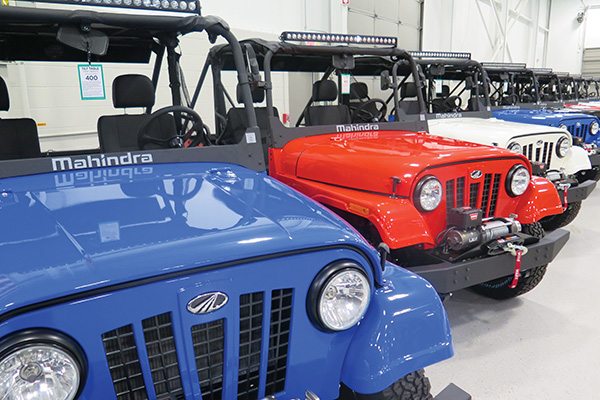Questions:
How much latitude does a state have in licensing a vehicle for highway use that does not me federal emissions or safety standards?
Can such a vehicle be driven across state lines legally?
That's kind of an apples-to-oranges comparison.
The Federal government has the authority to regulate IMPORTS and to require that vehicles that are imported for HIGHWAY use meet certain standards for emissions, safety, etc.
But once they're in the US, the Federal government doesn't regulate them as that is a state matter. Some states (like CA) have very strict emissions requirements that all but prohibit certain vehicles from being sold or registered there and other states have little or no emissions requirements.
States also have broad authority to regulate motorcycles and UTVs and to decide whether or under what circumstances they can be licensed for road use. In Colorado, for example, you CANNOT license a 4 wheeled vehicle for road use if it was not originally designed for road use (IOW you cannot put a license plate on a 4 wheeled ATV or UTV no matter what.) Now, there are counties in CO where ATVs/UTVs are permitted to drive on COUNTY roads, but in this case it's not so much that they're "legal" to use on the street (they're not), but rather that they are "tolerated" (or to put it differently, the county has made it a policy not to enforce the law and to look the other way.)
In other states, you CAN get a license plate on a UTV or ATV, it's almost always a "Motorcycle" license plate and sometimes there are restrictions on where you can use it (often having to do with speed limits - such as "cannot use on any road where the speed limit is greater than 50mph.")
As far as driving THOSE vehicles across state lines - yes, it CAN be legal as long as the vehicle is operated in a legal manner in BOTH states. So, for example, if South Dakota allows a Roxor to be plated as a UTV and Wyoming does as well, then you could drive a South Dakota registered ROXOR into Wyoming and vice-versa.
But you COULD NOT drive it into Colorado, even though it has a Wyoming or South Dakota plate because 4 wheeled ATVs are not street legal in CO, no matter where they are registered.
Roxor, IMO, is trying to game the system by bringing in what is, to any observer, a 4 wheeled automobile and classifying it as a UTV so as to avoid the requirements that imported automobiles have for safety, rollover protection, air bags, emissions, lighting, etc.
At this point Mahindra is basically
daring the Federal government to tighten up the rules as to what can be classified as a "UTV" for purposes of importation (I don't think there are any right now.) After all, if the Mahindra is successful, what is to prevent someone from importing, say, a 70-series LC to the US and classifying it as a "UTV?" Or maybe one of those Russian 4 wheel drive vehicles that do not otherwise meet safety and emissions standards?
You could even take it to ridiculous extremes and try to import an 8x8 KAMAZ tractor as a "UTV."
But the REAL legal danger, IMO, does not come from the Feds, it comes from lawsuit-happy attorneys, the plantiff's bar. If someone gets injured because a Roxor was illegally being used on a highway - particularly if it can be claimed that the injury is due to lack of airbags, ABS, rollover protection or other things that a road-legal vehicle would have - then the lawyers will argue that Roxor is trying to exploit a "loophole" in the law to illegally import vehicles that don't meet safety standards with the knowledge that (despite their disclaimers otherwise) they will be used as highway vehicles. That puts Mahindra into a very tough spot legally and it won't take long before Manhinra's own lawyers tell them to stop exporting them to the US.
To see a great example of how this actually happened, look at how quickly the 3-wheeled ATVs disappeared in the mid 1980s. It only took a few lawsuits and all of a sudden the manufacturers realized that "death trikes" were not a good thing to be selling in the US.





